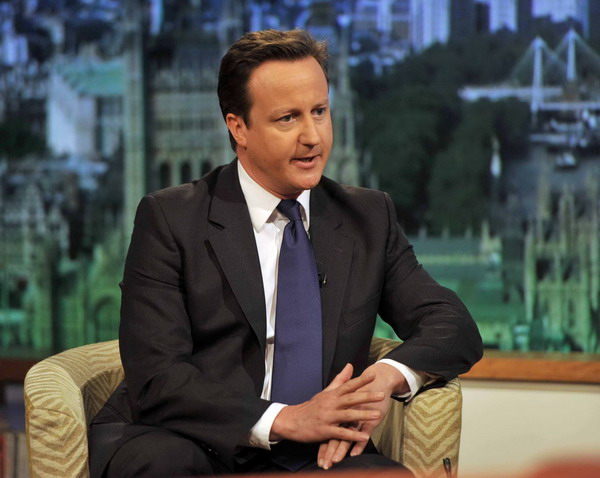Global General
UK's Cameron urges vigilance after bin Laden death
(Agencies)
Updated: 2011-05-02 18:06
 |
Large Medium Small |
|
 Britain's Prime Minister, David Cameron, speaks on the BBC's Andrew Marr Show, in London May 1, 2011. [Photo/Agencies] |
|
||||
Cameron said in a televised statement from his official country residence Chequers that bin Laden's death would be "welcomed right across our country".
"Of course, it does not mark the end of the threat we face from extremist terror. Indeed, we will have to be particularly vigilant in the weeks ahead. But it is, I believe, a massive step forward," he said.
Britain's Foreign Secretary William Hague said he expected heightened vigilance at posts abroad for "some time to come".
"There may be parts of al Qaeda that will try to show that they are still in business in the coming weeks as indeed some of them are," Hague told BBC Radio 4, during a trip to Cairo.
"I have already this morning asked our embassies to review their security."
Britain remains at its second-highest threat level of severe, meaning a militant attack is considered highly likely.
Cameron said bin Laden, who was killed on Sunday in a firefight with US forces in Pakistan, had been responsible for ordering the death of many British citizens both at home and in other parts of the world.
In July 2005, four young British Islamists inspired by al Qaeda killed 52 commuters in suicide bomb attacks on the capital's transport network, and security services have since foiled a number of plots.
"Above all today we should think of the victims of the poisonous extremism that this man has been responsible for," Cameron said.
Bin Laden was shot during an attack on a compound in Abbottabed, north of Islamabad, despite the general assumption being that he had been in the mountainous region between Afghanistan and Pakistan.
"Well, you end up in the business of world politics, terrorism, diplomacy, not being surprised by anything in the end," Hague said, when asked about bin Laden's whereabouts.
Bin Laden was "the world's most prominent terrorist leader" and his death in the long-term was a "very positive development", the foreign secretary said.
But Britain's work in Afghanistan would continue to be "phenomenally difficult and must go on", he added.
"So it would be wrong to draw the conclusion that suddenly we have solved a mass of the world's problems."
Nevertheless, in an earlier statement Cameron said bin Laden's death would "bring great relief to people across the world."
| 分享按鈕 |



